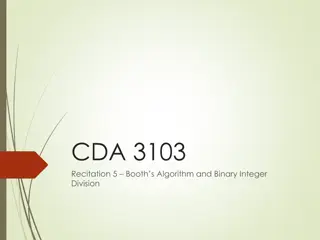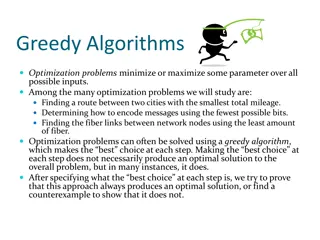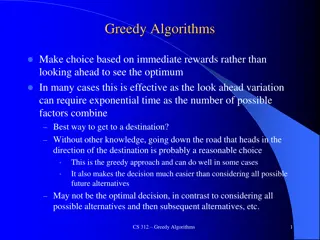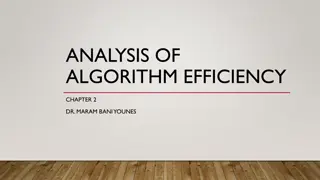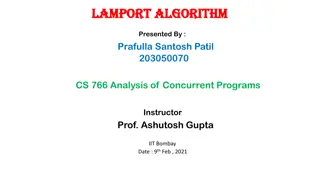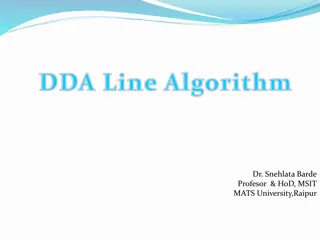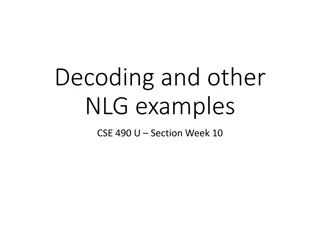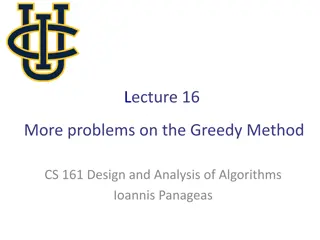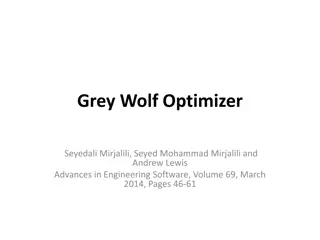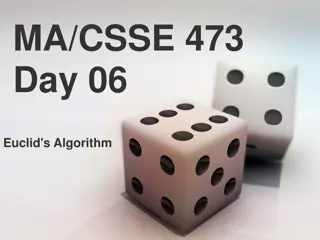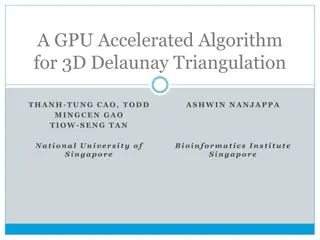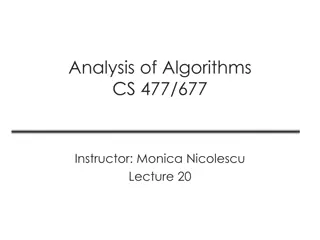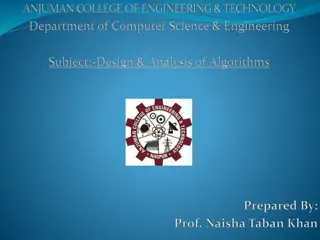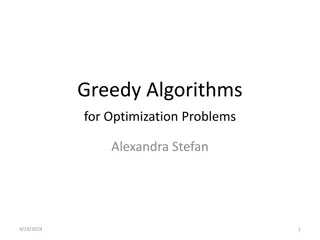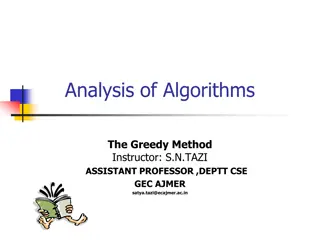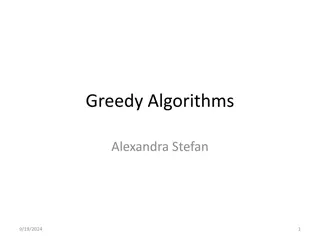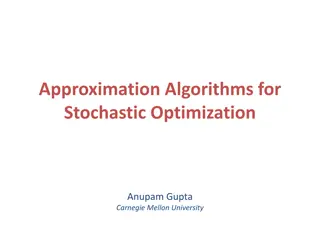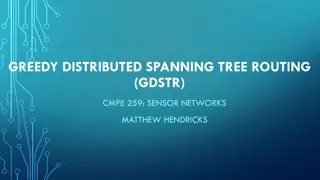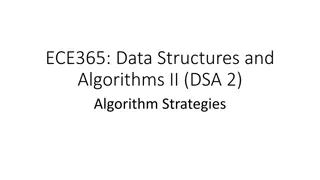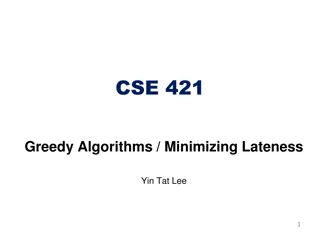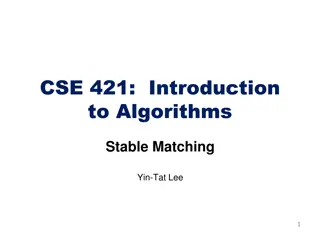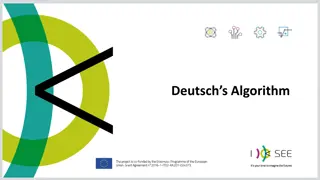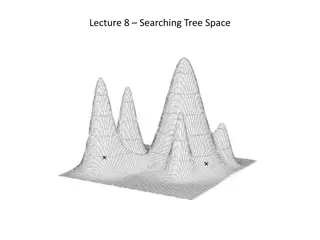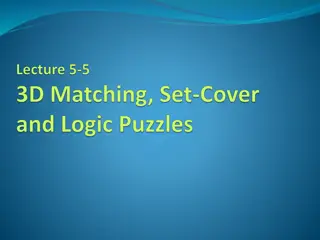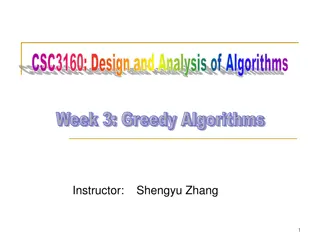Algorithm Analysis
Algorithm analysis involves evaluating the efficiency of algorithms through measures such as time and memory complexity. This analysis helps in comparing different algorithms, understanding how time scales with input size, and predicting performance as input size approaches infinity. Scaling analysi
1 views • 30 slides
Understanding Greedy Algorithms and Minimum Spanning Trees
Greedy algorithms build solutions by considering objects one at a time using simple rules, while Minimum Spanning Trees find the most cost-effective way to connect vertices in a weighted graph. Greedy algorithms can be powerful, but their correctness relies on subtle proofs and careful implementatio
6 views • 61 slides
Understanding Booth's Algorithm for Binary Integer Division
Learn about Booth's Algorithm and how it facilitates binary integer division. Discover key points to remember when using the algorithm, steps to initiate the process, and a detailed example to illustrate the multiplication of two operands using Booth's Algorithm.
0 views • 42 slides
Greedy Algorithms in Optimization Problems
Greedy algorithms are efficient approaches for solving optimization problems by making the best choice at each step. This method is applied in various scenarios such as finding optimal routes, encoding messages, and minimizing resource usage. One example is the Greedy Change-Making Algorithm for mak
0 views • 12 slides
Understanding Stable Matchings and the Gale-Shapley Algorithm
The concept of stable matchings is explored, along with the Gale-Shapley algorithm for finding them efficiently. Key ideas and steps of the algorithm are explained, supported by visuals. The process, examples, and observations related to the algorithm's effectiveness are discussed, highlighting the
1 views • 29 slides
Understanding Greedy Algorithms in Computer Science
Greedy Algorithms make decisions based on immediate rewards, prioritizing current benefits over future optimal solutions. This approach is efficient for certain problems, such as finding the best move in chess or solving the coins problem. Greedy algorithms offer simplicity and speed by selecting th
2 views • 69 slides
Ricart and Agrawala's Algorithm for Mutual Exclusion
The Ricart-Agrawala Algorithm is a distributed system algorithm for achieving mutual exclusion without the need for release messages, developed by Glenn Ricart and Ashok Agrawala. The algorithm involves processes sending timestamped requests to enter a critical section, with careful handling of repl
1 views • 16 slides
Understanding Algorithm Efficiency Analysis
In this chapter, Dr. Maram Bani Younes delves into the analysis of algorithm efficiency, focusing on aspects such as order of growth, best case scenarios, and empirical analysis of time efficiency. The dimensions of generality, simplicity, time efficiency, and space efficiency are explored, with a d
1 views • 28 slides
Understanding Lamport Algorithm for Mutual Exclusion
Lamport Algorithm, presented by Prafulla Santosh Patil, is a permission-based algorithm utilizing timestamps to order critical section requests and resolve conflicts. It employs three types of messages: REQUEST, REPLY, and RELEASE, where each site manages a queue to store requests. By ensuring commu
0 views • 15 slides
Digital Differential Analyzer (DDA) Algorithm in Computer Graphics
In computer graphics, the Digital Differential Analyzer (DDA) Algorithm is utilized as the basic line drawing algorithm. This method involves interpolation of variables between two endpoints to rasterize lines, triangles, and polygons efficiently. The algorithm requires inputting coordinates of two
0 views • 9 slides
Exploring Algorithm Design Approaches with Dr. Jey Veerasamy
Discover a range of algorithm design approaches including quick-sort, merge-sort, divide and conquer characteristics, greedy approach, and solutions to various optimization problems such as petrol cost minimization, number of stops minimization, activity selection, and knapsack problem. Dive into th
0 views • 14 slides
Decoding and NLG Examples in CSE 490U Section Week 10
This content delves into the concept of decoding in natural language generation (NLG) using RNN Encoder-Decoder models. It discusses decoding approaches such as greedy decoding, sampling from probability distributions, and beam search in RNNs. It also explores applications of decoding and machine tr
0 views • 28 slides
Greedy Method for Task Scheduling Problems
The greedy method is a powerful algorithm design technique used in solving various optimization problems. In the context of task scheduling, we explore two specific problems: minimizing the number of machines needed to complete all tasks and maximizing the number of non-overlapping intervals on a si
1 views • 58 slides
Algorithm Design Techniques: Divide and Conquer
Algorithm design techniques such as divide and conquer, dynamic programming, and greedy algorithms are essential for solving complex problems by breaking them down into smaller sub-problems and combining their solutions. Divide and conquer involves breaking a problem into unrelated sub-problems, sol
1 views • 13 slides
Grey Wolf Optimizer: A Nature-Inspired Optimization Algorithm
The Grey Wolf Optimizer algorithm is based on the social hierarchy of grey wolves in the wild. Inspired by the pack behavior of grey wolves, this algorithm utilizes alpha, beta, and delta solutions to guide the optimization process. The hunting phases of tracking, pursuing, and attacking prey mimic
3 views • 16 slides
Emergency Paediatric Tracheostomy Management Algorithm
Emergency Paediatric Tracheostomy Management Algorithm provides a structured approach for managing pediatric patients requiring tracheostomy in emergency situations. The algorithm outlines steps for assessing airway patency, performing suction, and changing the tracheostomy tube if necessary. It emp
0 views • 4 slides
Development of Satellite Passive Microwave Snowfall Detection Algorithm
This study focuses on the development of a satellite passive microwave snowfall detection algorithm, highlighting the challenges in accurately determining snowfall using satellite instruments. The algorithm uses data from AMSU/MHS, ATMS, and SSMIS sensors to generate snowfall rate estimates, overcom
0 views • 20 slides
Understanding Euclid's Algorithm: An Ancient Approach to Finding Greatest Common Divisors
Euclid's Algorithm, dating back 2500 years, offers a simpler method to find the greatest common divisor (gcd) of two non-negative integers compared to traditional factorization. By iteratively applying a rule based on the gcd of remainders, it efficiently computes gcd values. The basis of the algori
0 views • 15 slides
GPU Accelerated Algorithm for 3D Delaunay Triangulation
Thanh-Tung Cao, Todd Mingcen Gao, Tiow-Seng Tan, and Ashwin Nanjappa from the National University of Singapore's Bioinformatics Institute present a GPU-accelerated algorithm for 3D Delaunay triangulation. Their work explores the background, related works, algorithm implementation, and results of thi
0 views • 24 slides
Understanding the Knapsack Problem in Dynamic Programming
Explore the concept of the Knapsack Problem in dynamic programming, focusing on the 0/1 Knapsack Problem and the greedy approach. Understand the optimal substructure and greedy-choice properties, and learn how to determine the best items to maximize profit within a given weight constraint. Compare t
0 views • 23 slides
Understanding Greedy Algorithms in Algorithm Analysis
Greedy algorithms are a simpler approach compared to dynamic programming, focusing on making locally optimal choices in order to achieve a globally optimal solution. While not always yielding the best solution, greedy algorithms can provide optimal solutions for problems with specific characteristic
1 views • 23 slides
Comprehensive Course Overview on Algorithm Analysis and Design
Explore a detailed syllabus covering mathematical foundations, complexity calculations, asymptotic analysis, dynamic programming, traversal techniques, and more. Dive into key concepts like recursion, divide and conquer, greedy algorithms, backtracking, and approximation algorithms. Gain insights in
1 views • 11 slides
Understanding Greedy Algorithms in Algorithmic Design
Greedy algorithms in algorithmic design involve making the best choice at each step to tackle large, complex problems by breaking them into smaller sub-problems. While they provide efficient solutions for some problems, they may not always work, especially in scenarios like navigating one-way street
0 views • 9 slides
Greedy Algorithms for Optimization Problems
The concept of Greedy Algorithms for Optimization Problems is explained, focusing on the Knapsack problem and Job Scheduling. Greedy methods involve making locally optimal choices to achieve the best overall solution. Various scenarios like Huffman coding and graph problems are discussed to illustra
0 views • 28 slides
Greedy Method in Algorithm Design: An Overview
Greedy method is a powerful algorithm design technique where choices are made based on maximizing or minimizing an objective function. By making decisions greedily, one can reach either local or global optimal solutions step by step. While Greedy algorithm works efficiently in many scenarios, it may
0 views • 46 slides
Overview of Greedy Method in Algorithm Analysis
The Greedy Method in algorithm analysis involves making locally optimal decisions that eventually lead to a globally optimal solution. This method is illustrated through examples such as finding the shortest paths on special and multi-stage graphs, and solving the activity selection problem. While t
0 views • 16 slides
Greedy Algorithms and Optimization Problems Overview
A comprehensive overview of greedy algorithms and optimization problems, covering topics such as the knapsack problem, job scheduling, and Huffman coding. Greedy methods for optimization problems are discussed, along with variations of the knapsack problem and key strategies for solving these proble
0 views • 17 slides
Approximation Algorithms for Stochastic Optimization: An Overview
This piece discusses approximation algorithms for stochastic optimization problems, focusing on modeling uncertainty in inputs, adapting to stochastic predictions, and exploring different optimization themes. It covers topics such as weakening the adversary in online stochastic optimization, two-sta
0 views • 33 slides
Understanding Greedy Distributed Spanning Tree Routing in Wireless Sensor Networks
Wireless sensor networks play a critical role in various applications, and the Greedy Distributed Spanning Tree Routing (GDSTR) protocol, developed by Matthew Hendricks, offers an efficient routing approach. This protocol addresses challenges such as scalability, dynamic topologies, and sensor node
0 views • 34 slides
Algorithm Strategies: Greedy Algorithms and the Coin-changing Problem
This topic delves into general algorithm strategies, focusing on the concept of greedy algorithms where locally optimal choices are made with the hope of finding a globally optimal solution. The discussion includes the nature of greedy algorithms, examples such as Dijkstra's algorithm and Prim's alg
0 views • 91 slides
Understanding Greedy Algorithms in Interval Scheduling
Interval Scheduling is a classic algorithmic problem where the goal is to schedule a set of tasks to maximize efficiency without overlap. Greedy algorithms play a crucial role in solving this problem by making locally optimal choices at each step. The concept of greediness, building the solution ste
0 views • 24 slides
Greedy Algorithms for Minimizing Lateness
The content discusses the application of greedy algorithms in minimizing lateness in scheduling tasks with deadlines. It covers strategies for finding optimal schedules to reduce lateness and maximize efficiency. Various approaches such as considering jobs by processing time, slack, and deadline are
0 views • 16 slides
Stable Matching Problem and Gale-Shapley Algorithm Overview
The content provides information on the stable matching problem and the Gale-Shapley algorithm. It covers the definition of stable matching, the workings of the Gale-Shapley algorithm, tips for algorithm implementation, and common questions related to the topic. The content also includes a summary o
0 views • 16 slides
Greedy Cat - A Fun and Entertaining Story by Kauri
Get ready to embark on a delightful adventure with Greedy Cat in this captivating story by Kauri. Follow Greedy Cat's escapades through a series of enjoyable slides, each filled with whimsical illustrations that will surely bring a smile to your face. Join Greedy Cat on a journey full of fun and exc
0 views • 14 slides
Lunch for Greedy Cat by Kauri 2 - A Delightful Visual Journey
Dive into the whimsical world of "Lunch for Greedy Cat" by Kauri 2 through a series of captivating images capturing the mischievous adventures of a hungry cat. The colorful and humorous illustrations bring to life the antics and escapades of the feline protagonist in a delightful way, sure to entert
0 views • 25 slides
The Greedy Leprechaun and the Wealthy Man
In a whimsical tale, a greedy leprechaun's love for gold leads him to schemes and deceit until he meets a wealthy man offering to make him rich. Enticed by the promise of more gold, the leprechaun seeks ways to increase his wealth, ultimately setting off a chain of events that challenge his cunning
0 views • 24 slides
Understanding Deutsch's Algorithm in Quantum Computing
Deutsch's Algorithm is a fundamental quantum algorithm designed to solve the problem of determining if a given function is constant or balanced. This algorithm leverages quantum principles such as superposition and entanglement to provide a more efficient solution compared to classical methods. By e
0 views • 17 slides
Advanced Techniques in Tree Space Searching for Phylogenetic Analysis
Explore advanced methods like Nearest-neighbor interchange (NNI), Subtree Pruning-Regrafting (SPR), and Tree Bisection-Reconnection (TBR) for searching tree space efficiently in phylogenetic analysis. Discover strategies for optimal tree selection, including greedy and less greedy approaches, and th
0 views • 13 slides
Combinatorial Optimization in Integer Programming and Set-Cover Problems
Explore various combinatorial optimization problems such as Integer Programming, TSP, Knapsack, Set-Cover, and more. Understand concepts like 3-Dimensional Matching, SAT, and how Greedy Algorithms play a role. Delve into NP-Hard problems like Set-Cover and analyze the outcomes of Greedy Algorithm se
0 views • 60 slides
Greedy Algorithms: Minimum Spanning Tree Analysis
Explore the concept of Minimum Spanning Tree (MST) in the context of greedy algorithms, focusing on Kruskal's Algorithm. Understand the methodology behind selecting the minimum weighted subgraph that connects all vertices in a weighted graph efficiently. Delve into problem-solving strategies and app
0 views • 39 slides


